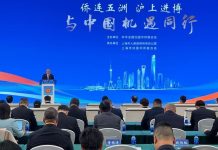KOTA KINABALU,L: Tan Sri T.C Goh, the President of the Federation of Chinese Associations Malaysia (Huazong), agrees with Prime Minister Datuk Seri Anwar Ibrahim’s statement that Sabah’s marine resources have not been fully tapped into and need enhancement.
He hopes that the federal and state governments, in collaboration with the private sector, will thoroughly explore and emulate the durian export strategy to export Sabah’s seafood to international markets.
He pointed out that the common key point between seafood and durian exports is that the more delicious and fresh they are, the higher their value.
“Transport Minister Anthony Loke has also previously suggested using Hong Kong International Airport, as a transit hub, to airlift Sabah’s famous seafood, such as tiger prawns and grouper, to international markets. This is a proposal worthy of serious consideration by the government and relevant industry players,” he said.
He pointed out that currently, besides catering for domestic consumption, seafood from the state is also supplied to Peninsular Malaysia, Singapore, and China. However, if the aim is to further expand into overseas markets, in addition to government efforts, there is also a need for collaboration with the private sector to fully develop deep-sea fishing industries.
Goh also urged the federal government to provide full support for Sabah’s blue economy sector, especially the deep-sea fishing industry, which has great potential. He also called for enhancement of logistics, including air transport, to ensure that Sabah’s seafood can be exported fresh and reach international markets faster.
He continued that both local and international tourists enjoy the affordable and high-quality seafood in Sabah, which has made the state one of the country’s renowned destinations for “food tourism.”
Goh who is also the President of the Federation of Chinese Associations Sabah (FCAS) said this in a statement today, in response to Prime Minister Anwar’s remarks during the opening of the 2024 Sabah International Blue Economy Conference (SIBEC). The Prime Minister pointed out that despite Sabah’s abundant marine resources, the state still imports over 50% of its food, reflecting that the marine resources are not being fully tapped into. The Prime Minister thus called on the Sabah state government to make full use of its marine resources to enhance food security and reduce dependency on imported food.
Goh noted that while Sabah has abundant marine resources and over 3,000 fishing vessels involved in the fishing industry, most operations are confined to shallow waters within 30 nautical miles from the shore, and deep-sea operations still require significant improvement.
He thus called on the government and the private sector to work together to introduce and train people in using advanced fishing technologies and equipment, with the aim of developing deep-sea fishing industries in a more professional and corporate approach.
He also highlighted that in 2021, the federal government, in accordance to the 1963 Malaysia Agreement (MA63), delegated deep-sea fishing rights to the East Malaysian governments, including Sabah. This allows the Sabah government, through the Sabah Fisheries Department, to have full autonomy, including issuing deep-sea fishing licenses and fishing equipment permits.
He added that Sabah’s blue economy has an estimated annual yield potential of over 491,000 tons, valued at RM3.25 billion, with huge development potential. However, less than half of these resources have been tapped so far. He thus called on the federal and state governments to collaborate and encourage private sector participation to fully develop Sabah’s blue economy.
He further noted that within the scope of the blue economy, in addition to fishing, there are also opportunities to develop renewable marine energy, blue carbon, tourism, maritime transportation, marine biotechnology, and other upstream and downstream industries, all of which have investment potential.-pr/BNN






